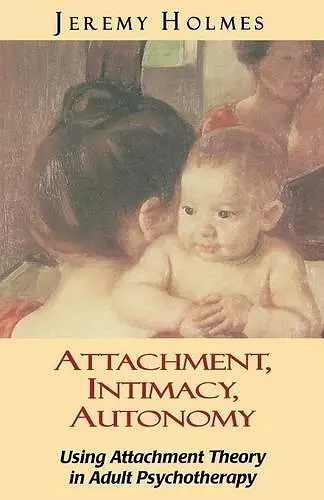Attachment, Intimacy, Autonomy
Using Attachment Theory in Adult Psychotherapy
Format:Paperback
Publisher:Jason Aronson Publishers
Published:1st Dec '96
Currently unavailable, and unfortunately no date known when it will be back

Attachment theory is on the leading edge of a conceptual revolution. It offers a new paradigm that can synthesize into a more coherent whole the best ideas from psychoanalysis, cognitive science, and neurobiology. With its emphasis on relationships, attachment theory is determinedly humanistic, while retaining the scientific vigor of Darwinian ethnology. Attachment theory provides an overall framework for thinking about relationships, or more accurately, about those aspects of relationships that are shaped by threat and the need for security, themes that are central to the work of psychotherapy. In this book Jeremy Holmes explores the contribution of attachment theory to everyday psycho-therapeutic practice where patients are usually seen once weekly, or less, for no more than two to three years.
Jeremy Holmes is the most significant contemporary theorist currently using attachment theory as a basis for psychotherapeutic practice. In this book he develops and amplifies Bowlby's original ideas by linking them to current work in child development and psychotherapy. In a crucial distinction, he shows that attachment and intimacy refer to different forms of relating which are developmentally connected, the form of attachment shaping the later style of intimate behavior. This maturation is related to the capacity for narrative. -- Russell Meares
Holmes not only gives clinicians a fundamental understanding of attachment theory but demonstrates its applicability to everyday practice concerns. By describing the characteristics of avoidant and ambivalent attachment, he helps therapists understand more fully the difficulties that patients have in achieving, maintaining, and thriving within a secure base. -- Karen B. Walant
Attachment theory has finally come into its own in the clinical setting. The conceptual framework provided by Bowlby, Ainsworth, and their successors has wide psychotherapeutic applications that are brilliantly described in this impressive work by Jeremy Holmes. Much that is chaotic in the clinical setting becomes clear and understandable when the principles of attachment theory are brought to bear. To the reader's great good fortune, Holmes's prose style is a model of clarity so that abstruse concepts are effortlessly grasped by the reader and the author's humanity shines through. -- Glen O. Gabbard
ISBN: 9781568218724
Dimensions: 210mm x 137mm x 15mm
Weight: 308g
264 pages